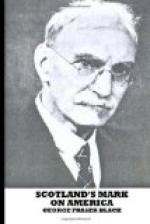The following Scots were members of His Majesty’s Council in South Carolina under the royal government, from 1720 to 1776: Alexander Skene, James Kinloch (1729), John Cleland, James Graeme, George Saxby, James Michie, John Rattray (1761), Thomas Knox Gordon, and John Stuart. Andrew Rutledge was Speaker of the Commons’ House of Assembly from 1749 to 1752. David Graeme, attorney at law in 1754, was Attorney-General of the State from 1757 to 1764. James Graeme, most probably a relation of the preceding, was elected to the Assembly from Port Royal in 1732, became Judge of the Court of Vice Admiralty from 1742 to 1752, and Chief Justice from 1749 to 1752. James Michie was Speaker of the Assembly from 1752 to 1754, Judge of the Court of Admiralty from 1752 to 1754, and Chief Justice from 1759 to 1761. William Simpson served as Chief Justice 1761-1762. Thomas Knox Gordon was appointed Chief Justice in 1771 and served till 1776, and in 1773 he also appears as Member of Council. John Murray was appointed Associate Justice in 1771 and died in 1774. William Gregory was appointed by His Majesty’s mandamus to succeed him in 1774. Robert Hume was Speaker of the Assembly in 1732-1733. Robert Brisbane was Associate Justice in 1764, and Robert Pringle appears in the same office in 1760 and 1766. John Rattray was Judge of the Court of Vice-Admiralty in 1760-61, and James Abercrombie appears as Attorney-General in 1731-32. James Simpson was Clerk of the Council in 1773, Surveyor-General of Land in 1772, Attorney-General in 1774-75, and Judge of Vice-Admiralty in the absence of Sir Augustus Johnson in 1769. John Carwood was Assistant Justice in 1725. Thomas Nairne was employed in 1707 “as resident agent among the Indians, with power to settle all disputes among traders ... to arrest traders who were guilty of misdemeanors and send them to Charleston for trial, to take charge of the goods of persons who were committed to prison, and to exercise the power of a justice of the peace.” This Thomas Nairne is probably the same individual who published, anonymously, “A letter from South Carolina; giving an account of the soil ... product ... trade ... government [etc.] of that province. Written by a Swiss Gentleman to his friend at Bern,” the first edition of which was published in London in 1710 (second ed. in 1732).
Among the names of the seventeen corporate members of the Charleston Library Society established in 1743 occur those of the following Scots: Robert Brisbane, Alexander M’Cauley, Patrick M’Kie, William Logan, John Sinclair, James Grindlay, Alexander Baron, and Charles Stevenson.
Of the members of the Provincial Congress held at Charleston in January, 1775, the following were Scotsmen or men of Scottish ancestry: Major John Caldwell, Patrick Calhoun (ancestor of Vice-President Calhoun), George Haig of the family of Bemersyde, Charles Elliott, Thomas Ferguson, Adam Macdonald, Alexander M’Intosh, John M’Ness, Isaac MacPherson, Col. William Moultrie, David Oliphant, George Ross, Thomas Rutledge, James Sinkler, James Skirving, senior, James Skirving, junior, William Skirving, and Rev. William Tennent.




